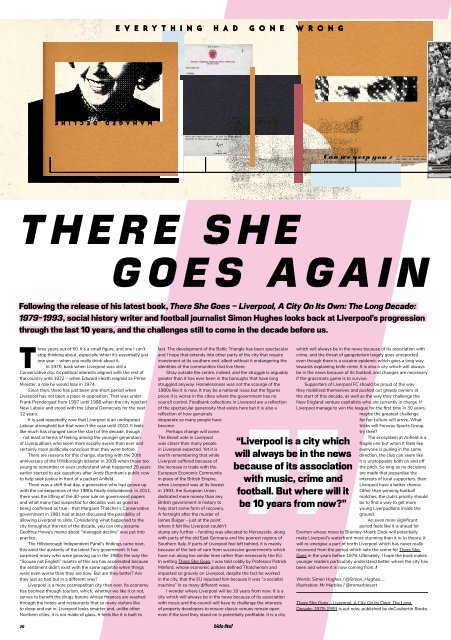Issue 106 / Dec 2019/Jan 2020
December 2019/January 2020 double issue of Bido Lito! magazine. Featuring: BEIJA FLO, ASOK, LO FIVE, SIMON HUGHES, CONVENIENCE GALLERY, BEAK>, STUDIO ELECTROPHONIQUE, ALEX TELEKO, SHE DREW THE GUN, IMTIAZ DHARKER and much more.
December 2019/January 2020 double issue of Bido Lito! magazine. Featuring: BEIJA FLO, ASOK, LO FIVE, SIMON HUGHES, CONVENIENCE GALLERY, BEAK>, STUDIO ELECTROPHONIQUE, ALEX TELEKO, SHE DREW THE GUN, IMTIAZ DHARKER and much more.
Create successful ePaper yourself
Turn your PDF publications into a flip-book with our unique Google optimized e-Paper software.
THERE SHE<br />
GOES AGAIN<br />
Following the release of his latest book, There She Goes – Liverpool, A City On Its Own: The Long <strong>Dec</strong>ade:<br />
1979-1993, social history writer and football journalist Simon Hughes looks back at Liverpool’s progression<br />
through the last 10 years, and the challenges still to come in the decade before us.<br />
Three years out of 50. It’s a small figure, and one I can’t<br />
stop thinking about, especially when it’s essentially just<br />
one year – when you really think about it.<br />
In 1970, back when Liverpool was still a<br />
Conservative city, its political interests aligned with the rest of<br />
the country until 1972 – when Edward Heath reigned as Prime<br />
Minister, a role he would lose in 1974.<br />
Since then, there has just been one short period when<br />
Liverpool has not been a place in opposition. That was under<br />
Frank Prendergast from 1997 until 1998 when the city rejected<br />
New Labour and stood with the Liberal Democrats for the next<br />
12 years.<br />
It is said repeatedly now that Liverpool is an undisputed<br />
Labour stronghold but that wasn’t the case until 2010. It feels<br />
like much has changed since the start of the decade, though<br />
– not least in terms of feeling among the younger generation<br />
of Liverpudlians who seem more socially aware than ever and<br />
certainly more politically conscious than they were before.<br />
There are reasons for this change, starting with the 20th<br />
anniversary of the Hillsborough disaster in 2009 when those too<br />
young to remember or even understand what happened 20 years<br />
earlier started to ask questions after Andy Burnham’s public vow<br />
to help seek justice in front of a packed Anfield.<br />
There was a shift that day, a generation who had grown up<br />
with the consequences of the 1980s finally emboldened. In 2011,<br />
there was the lifting of the 30-year rule on government papers<br />
and what many had suspected for decades was as good as<br />
being confirmed as true – that Margaret Thatcher’s Conservative<br />
government in 1981 had at least discussed the possibility of<br />
allowing Liverpool to slide. Considering what happened to the<br />
city throughout the rest of the decade, you can only assume<br />
Geoffrey Howe’s memo about “managed decline” was put into<br />
practice.<br />
The Hillsborough Independent Panel’s findings came next,<br />
this amid the austerity of the latest Tory government. It has<br />
surprised many who were growing up in the 1980s the way the<br />
“Scouse not English” mantra of this era has accelerated because<br />
the sentiment didn’t exist with the same appetite when things<br />
were even worse than they are now. But are they better? Are<br />
they just as bad but in a different way?<br />
Liverpool is a more cosmopolitan city than ever. Its economy<br />
has boomed through tourism, which, whether we like it or not,<br />
serves to benefit the drugs barons whose finances are washed<br />
through the hotels and restaurants that so many visitors like<br />
to sleep and eat in. Liverpool looks smarter and, unlike other<br />
Northern cities, it is not made of glass. It feels like it is built to<br />
last. The development of the Baltic Triangle has been spectacular<br />
and I hope that extends into other parts of the city that require<br />
investment at its southern end, albeit without it endangering the<br />
identities of the communities that live there.<br />
Stray outside the centre, indeed, and the struggle is arguably<br />
greater than it has ever been in the boroughs that have long<br />
struggled anyway. Homelessness was not the scourge of the<br />
1980s like it is now. It may be a national issue but the figures<br />
prove it is worse in the cities where the government has no<br />
council control. Foodbank collections in Liverpool are a reflection<br />
of the spectacular generosity that exists here but it is also a<br />
reflection of how genuinely<br />
desperate so many people have<br />
become.<br />
Perhaps change will come.<br />
The Brexit vote in Liverpool<br />
was closer than many people<br />
in Liverpool expected. Yet it is<br />
worth remembering that while<br />
Liverpool suffered because of<br />
the increase in trade with the<br />
European Economic Community<br />
in place of the British Empire,<br />
when Liverpool was at its lowest<br />
in 1993, the European Union<br />
dedicated more money than any<br />
British government in history to<br />
help start some form of recovery.<br />
A fortnight after the murder of<br />
James Bulger – just at the point<br />
where it felt like Liverpool couldn’t<br />
slump any further – funding was allocated to Merseyside, along<br />
with parts of the old East Germany and the poorest regions of<br />
Southern Italy. If parts of Liverpool feel left behind, it is mainly<br />
because of the lack of care from successive governments which<br />
have run along too similar lines rather than necessarily the EU.<br />
In writing There She Goes, I was told coldly by Professor Patrick<br />
Minford, whose economic policies defined Thatcherism and<br />
impacted so gravely on Liverpool, despite the fact he worked<br />
in the city, that the EU repulsed him because it was “a socialist<br />
machine” in so many different ways.<br />
I wonder where Liverpool will be 10 years from now. It is a<br />
city which will always be in the news because of its association<br />
with music and the council will have to challenge the interests<br />
of property developers to ensure classic venues remain open<br />
even if the land they stand on is potentially profitable. It is a city<br />
“Liverpool is a city which<br />
will always be in the news<br />
because of its association<br />
with music, crime and<br />
football. But where will it<br />
be 10 years from now?”<br />
which will always be in the news because of its association with<br />
crime, and the threat of gangsterism largely goes unreported<br />
even though there is a cocaine epidemic which goes a long way<br />
towards explaining knife crime. It is also a city which will always<br />
be in the news because of its football, and changes are necessary<br />
if the grassroots game is to survive.<br />
Supporters of Liverpool FC should be proud of the way<br />
they mobilised themselves and pushed out greedy owners at<br />
the start of this decade, as well as the way they challenge the<br />
New England venture capitalists who are currently in charge. If<br />
Liverpool manage to win the league for the first time in 30 years,<br />
maybe the greatest challenge<br />
for fan culture will arrive. What<br />
tricks will Fenway Sports Group<br />
try then?<br />
The ecosystem at Anfield is a<br />
fragile one but when it feels like<br />
everyone is pulling in the same<br />
direction, the club can seem like<br />
it is unstoppable both on and off<br />
the pitch. So long as no decisions<br />
are made that jeopardise the<br />
interests of local supporters, then<br />
Liverpool have a better chance.<br />
Other than winning football<br />
matches, the club’s priority should<br />
be to find a way to get more<br />
young Liverpudlians inside the<br />
ground.<br />
An even more significant<br />
period feels like it is ahead for<br />
Everton whose move to Bramley-Moore Dock will potentially<br />
make Liverpool’s waterfront more stunning than it is. In theory, it<br />
will re-energise a part of north Liverpool which has never really<br />
recovered from the period which sets the scene for There She<br />
Goes in the years before 1979. Ultimately, I hope the book makes<br />
younger readers particularly understand better where the city has<br />
been and where it is now coming from. !<br />
Words: Simon Hughes / @Simon_Hughes__<br />
Illustration: Mr Marbles / @mrmarblesart<br />
There She Goes – Liverpool, A City On Its Own: The Long<br />
<strong>Dec</strong>ade: 1979-1993 is out now, published by deCoubertin Books.<br />
26

















